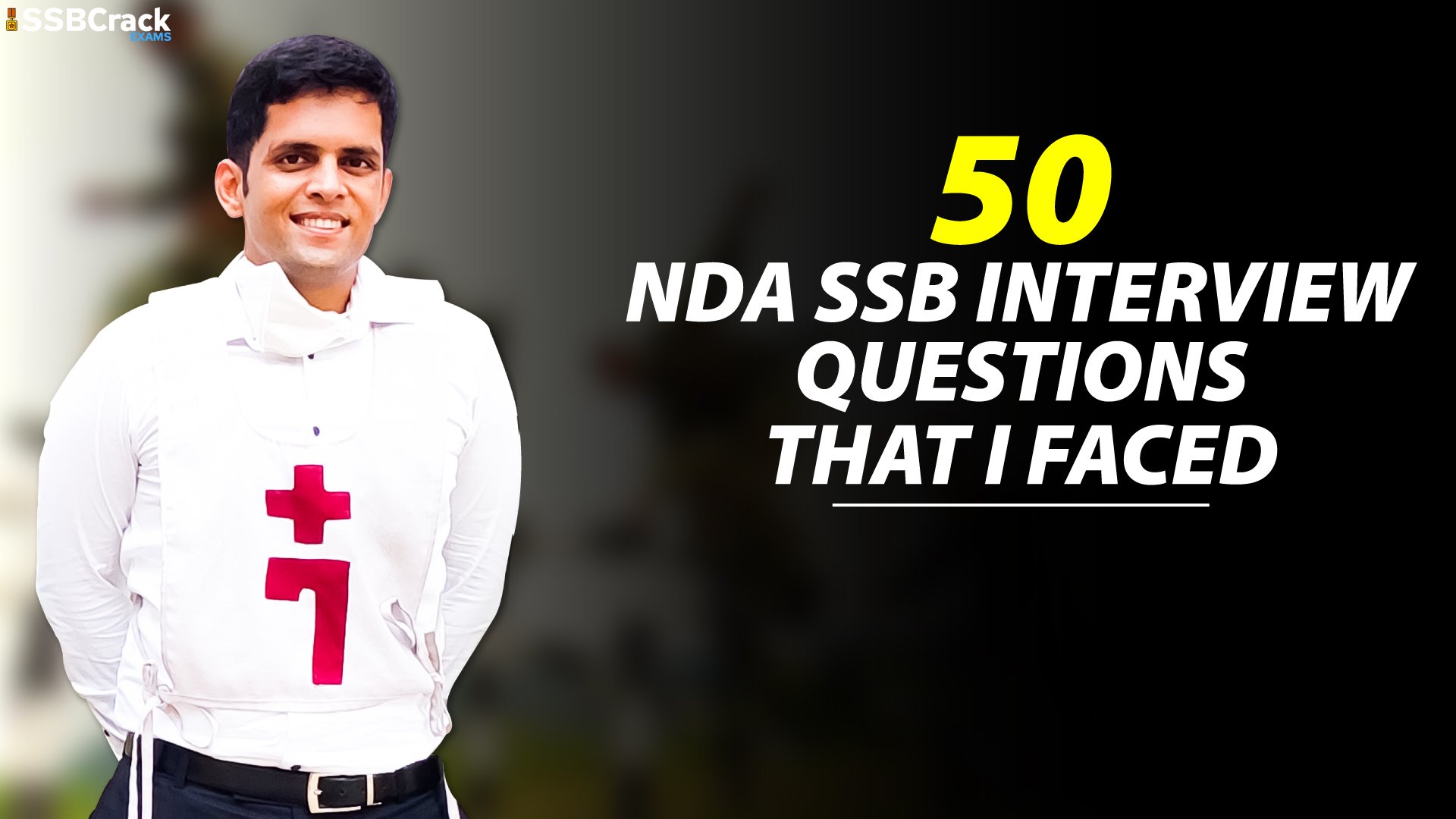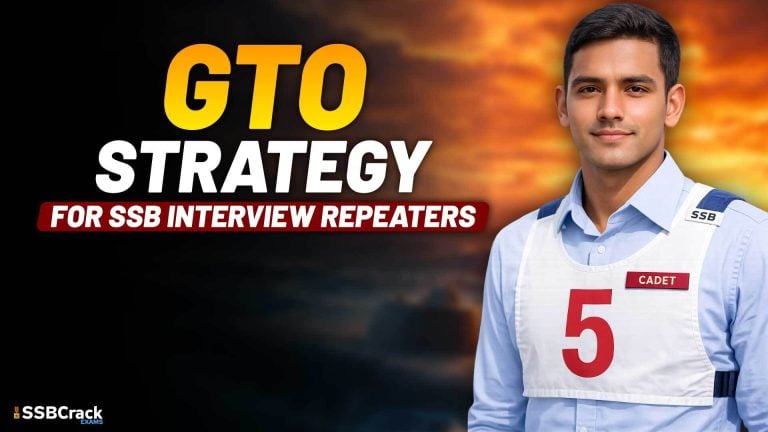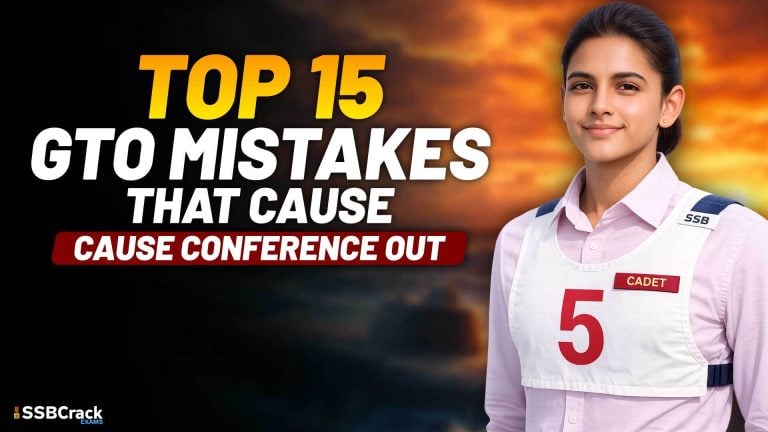The SSB (Services Selection Board) interview is a critical part of the selection process for candidates aspiring to join the National Defence Academy (NDA). As a multi-day assessment, it evaluates candidates on various parameters including leadership potential, social adaptability, intelligence, and emotional stability.
Having gone through this process myself, I’m sharing 50 authentic questions that either I or my batchmates faced during our SSB interviews. Understanding the pattern and preparing appropriate responses can significantly enhance your chances of success.
Understanding the SSB Interview Structure
The SSB interview follows a progressive pattern:
- Introductory questions – Basic questions to help you settle in
- Normal life situation questions – Questions about your personal experiences and relationships
- Current affairs and social issues – Questions testing your awareness and analytical abilities
- Technical/trade-specific questions – Questions relevant to your educational background
Part 1: Motivation and Career Choice Questions
1. Why do you want to join the army/navy/air force?
Sample Answer: “I’ve always been inspired by the discipline, courage, and selfless service of our armed forces. The opportunity to serve my country while leading a life of honor and adventure resonates deeply with my personal values. The Army/Navy/Air Force offers a unique combination of professional growth, leadership opportunities, and the chance to make a meaningful contribution to national security.”
2. Why do you want to join NDA and not rather enjoy your life in a college and then come through CDS Entry?
Sample Answer: “I believe in building a strong foundation early. Joining the NDA provides comprehensive training that shapes both character and professional skills from a young age. The rigorous military training alongside academic education creates well-rounded officers with deeper camaraderie and understanding of service values. While college life has its merits, I prefer the structured development, discipline, and the head start in my military career that NDA offers.”
3. Which regiment would you want to join and why?
Sample Answer: “I’m particularly drawn to the Infantry Regiment because of its direct combat role and the leadership opportunities it provides. The regiment’s rich history of valor and sacrifice in protecting our borders inspires me. I’m physically fit, enjoy tactical challenges, and believe my skills in teamwork and quick decision-making align well with what infantry operations demand. However, I’m open to serving wherever the organization needs me most.”
4. Why would we recommend you?
Sample Answer: “I believe my combination of academic performance, physical fitness, and leadership experience makes me a suitable candidate. During my school years, I consistently demonstrated initiative by organizing inter-school events and captaining the basketball team. I’ve developed resilience through overcoming personal challenges, such as recovering from a sports injury to lead my team to victory. My analytical abilities, adaptability to new situations, and genuine passion for serving in the armed forces would make me an asset to the organization.”
5. What if we don’t recommend you?
Sample Answer: “I would certainly be disappointed as joining the NDA is my primary goal. However, I believe in learning from every experience. I would request feedback to understand where I need improvement, work diligently on those areas, and apply again in the next cycle. Meanwhile, I would continue my academics while enhancing my physical fitness and leadership skills through community activities. This setback would test my resilience – a quality essential for military service – and I’m determined to prove my worth through persistent effort.”
6. What if you are recommended and are declared permanently unfit during medical tests?
Sample Answer: “That would be challenging to accept, but I understand that medical fitness standards exist to ensure operational effectiveness. I would seek clarification on the specific medical issue to determine if it’s something that can be addressed. If it’s permanently disqualifying for armed forces, I would redirect my passion for service through alternative paths like civil services or defense-related research and development. The core values I’ve developed during my preparation – discipline, leadership, and commitment to national service – would still serve me well in these alternative careers.”
7. If you are so passionate about the forces, then why did you not join the NCC?
Sample Answer: “While my school did not have an active NCC unit, I channeled my passion for the armed forces through alternative means. I participated in our school’s discipline committee which instilled similar values of discipline and leadership. I also regularly attended military exhibitions, read extensively about military history, and maintained consistent physical training. Additionally, I volunteered with local veterans’ organizations to understand service life better. These activities, while different from NCC, have helped develop the core qualities needed for military service. However, I recognize the value NCC provides and would have certainly joined had the opportunity been available.”
Part 2: Family Relationship Questions
8. Who are you closest to in your family?
Sample Answer: “I share a close bond with my father. He has always been my mentor, guiding me through difficult decisions while giving me the space to learn from my mistakes. We connect through our shared interest in military history and often discuss global strategic affairs. His disciplined approach to life and problem-solving has greatly influenced my own decision to pursue a career in the armed forces.”
9. When did you have arguments with your parents?
Sample Answer: “Like any family, we’ve had our disagreements. One significant instance was when I wanted to participate in a state-level sports competition that coincided with my pre-board examinations. My parents were concerned about my academics, while I believed I could manage both. Instead of rebelling, we had an open discussion where I presented a detailed study plan showing how I would prepare for both. This mature approach convinced them, and I ended up performing well in both the competition and examinations.”
10. How do you spend time with your family?
Sample Answer: “We prioritize quality family time despite everyone’s busy schedules. Sunday mornings are reserved for family walks followed by breakfast together where we discuss our week. We take an annual family trip which helps us reconnect away from daily routines. I also make it a point to assist my mother with household chores and help my younger sibling with studies. These simple yet consistent interactions have strengthened our family bonds.”
11. With whom you are not so close in your family?
Sample Answer: “I have a somewhat formal relationship with my paternal uncle. While there’s mutual respect, we have different perspectives on career choices – he values conventional corporate success, whereas I’m drawn to service-oriented professions. Rather than creating conflict, we’ve learned to appreciate our different viewpoints during family gatherings. I make efforts to find common ground through shared interests like cricket, and these interactions have gradually improved our understanding of each other. This experience has taught me the importance of maintaining respectful relationships despite differences – a skill valuable in military leadership.”
12. Instances where your family has helped you and where you helped your family
Sample Answer: “My family provided crucial support during my 12th board preparations when I was struggling with physics. My father, despite his busy schedule, arranged for a tutor and regularly reviewed my progress. My mother ensured I maintained a healthy routine during this stressful period. Conversely, when my mother fell ill last year, I managed household responsibilities for three weeks, balancing them with my studies. I also helped my younger sister improve her mathematics scores by developing creative teaching methods tailored to her learning style. These experiences reinforced the importance of mutual support and adaptability – values that align perfectly with military teamwork.”
13. Aspects of yours that your parents admire and those that they want you to improve upon?
Sample Answer: “My parents admire my determination and sense of responsibility. When I commit to something, whether it’s academics or sports, they know I’ll pursue it with full dedication. They’ve often appreciated how I’ve taken initiative in family matters, such as organizing our grandfather’s 75th birthday celebration. However, they feel I need to improve my tendency to take on too many responsibilities simultaneously, which sometimes affects my efficiency. They’ve also advised me to be more patient when explaining concepts to my younger siblings. I value their feedback and am actively working on these areas, recognizing that balanced leadership requires both initiative and restraint at appropriate times.”
Part 3: Friendship and Social Questions
14. Who is your closest friend and why?
Sample Answer: “Rahul has been my closest friend since 8th grade. What I value most about our friendship is the honest feedback we provide each other. When I was struggling with public speaking, he didn’t just offer comfort but helped me practice repeatedly until I improved. Our friendship is based on mutual respect and growth rather than just shared interests. We’ve supported each other through personal and academic challenges, which has strengthened our bond over the years.”
15. Who is your not so close friend and why?
Sample Answer: “Vikram and I have a cordial but not particularly close relationship. We were classmates for three years and while we get along well in group settings, we never developed a deeper connection. This is primarily because we have different approaches to life – he’s more spontaneous while I prefer planning. Additionally, our interests rarely overlap – he’s passionate about fine arts while I gravitate toward sports and outdoor activities. Despite these differences, we maintain mutual respect and collaborate effectively on class projects. This relationship has taught me to work constructively with diverse personalities, an important skill in a military setting where team cohesion is crucial regardless of personal preferences.”
16. Which attributes of yours do your friends like or dislike?
Sample Answer: “My friends appreciate my reliability and problem-solving approach. They know they can count on me during difficult situations. They also value my ability to bring humor to tense situations, which often helps in diffusing conflicts within our group. However, they sometimes find my perfectionism frustrating, especially during group projects where I tend to insist on multiple revisions. I’m working on balancing thoroughness with practicality and being more flexible when needed.”
17. Tell about qualities of your friend(s) you would like to imbibe and those you would want them to remove?
Sample Answer: “I admire Sandeep’s ability to remain composed under pressure. During our school’s annual function when the sound system failed minutes before our performance, his calm problem-solving prevented panic among team members. I’m consciously working to develop this composure. I also value Ravi’s creative thinking in addressing challenges from unconventional angles. Conversely, I’ve observed that Sandeep sometimes hesitates to take initiative due to fear of failure, and I’ve encouraged him to take calculated risks. Ravi occasionally prioritizes short-term enjoyment over long-term goals, which affects his consistency. I’ve shared constructive feedback with both, emphasizing how these adjustments could enhance their strengths. These observations have helped me understand the importance of balanced attributes in effective leadership.”
18. When did you have arguments with your friends?
Sample Answer: “Last year, there was a disagreement during our college festival organization. I was heading the logistics team and had a different approach than my friend who led the publicity team. We had conflicting requirements for budget allocation. Instead of letting it affect our friendship, we sat down with the complete data, identified priorities, and found a compromise that served the event’s overall goals. This experience taught us how to separate personal relationships from professional disagreements.”
Part 4: Academic and Personal Development Questions
19. Which is your favourite subject and why?
Sample Answer: “Physics has always fascinated me because it explains the fundamental laws governing our universe. I particularly enjoy how it combines theoretical concepts with practical applications. Understanding the principles of mechanics has helped me improve my sports performance, and learning about optics has made me appreciate the technology behind military equipment. I find satisfaction in solving complex physics problems as they develop my analytical thinking and patience.”
20. Which is your not so favourite subject and why?
Sample Answer: “While I appreciate all subjects for their unique contributions to knowledge, I find organic chemistry challenging. The vast number of reactions and exceptions to rules initially seemed overwhelming to memorize without clear patterns. However, I’ve developed strategies to improve in this area, such as creating visual connection maps and practice mechanisms regularly. This experience taught me the importance of adapting my learning approach for different challenges rather than avoiding difficult subjects. I believe this mindset of confronting and overcoming academic challenges rather than avoiding them will serve me well in military training, where versatility in learning different skills is essential.”
21. Why did your marks decrease from 10th-12th?
Sample Answer: “There was indeed a slight decline in my marks, primarily because the 11th-12th curriculum involved more conceptual depth than the relatively factual 10th syllabus. Initially, I continued my old study approach which proved insufficient. However, I recognized this challenge and adapted by forming a study group for complex concepts and increasing my practice with previous years’ papers. By the final exams, I had improved significantly, though not quite to my 10th standard level. This experience taught me the importance of adapting learning strategies to new challenges.”
22. What will your teachers tell about you?
Sample Answer: “My teachers would describe me as a consistently engaged student who contributes meaningfully to class discussions. My mathematics teacher would highlight my analytical approach to problem-solving, while my history teacher would mention my ability to connect historical events with contemporary scenarios. They would note my willingness to help peers who struggle with concepts I understand well. My physical education teacher would comment on my sportsmanship and team spirit during competitions. They might also mention areas where I’ve shown growth, such as overcoming my initial hesitation in public speaking through persistent practice. I believe they would recognize my determination to improve continuously rather than being satisfied with initial successes.”
23. Tell me your 5 strengths and weaknesses.
Sample Answer: “My key strengths include:
- Resilience – I recover quickly from setbacks, as demonstrated when I bounced back from a sports injury to win a district championship.
- Analytical thinking – I can break down complex problems into manageable components.
- Team leadership – I’ve successfully led my school’s debate team to state-level competitions.
- Time management – I effectively balance academics, sports, and social responsibilities.
- Adaptability – I adjust well to changing circumstances and environments.
My weaknesses include:
- Perfectionism – Sometimes I spend too much time on details.
- Public speaking anxiety – Though improving, I still get nervous before large audiences.
- Occasional impatience with slow processes – I’m working on this by practicing mindfulness.
- Difficulty delegating – I sometimes take on too much responsibility instead of trusting others.
- Over-analysis – Sometimes I overthink decisions, which I’m addressing by setting time limits for decision-making.”
Part 5: Leadership and Character Questions
24. Has there been any instance of your life which shows you are a leader?
Sample Answer: “During my final year of school, our annual social service project was at risk of cancellation due to lack of participation. Recognizing its importance, I took initiative by first understanding why students were reluctant—many found the chosen activity (cleaning a local park) uninspiring. I proposed an alternative: renovating facilities at an underfunded local school. I presented this to both the administration and students, highlighting the tangible impact we could make. Once approved, I organized teams based on skills, coordinated resources, and managed the timeline. Despite initial skepticism, we completed the project with 90% student participation. This taught me that effective leadership involves understanding people’s motivations and aligning them with meaningful goals.”
25. What are you doing to work on your weaknesses?
Sample Answer: “To address my public speaking anxiety, I’ve joined a debating club where I regularly participate in discussions. I’ve also created a structured improvement plan where I start with small audiences and gradually increase size and complexity. For my perfectionism, I’ve implemented timeboxing techniques—allocating specific time limits for tasks and learning to prioritize quality-impact balance rather than pursuing perfection in every detail. I also seek feedback from mentors and peers to identify blind spots in my self-improvement efforts. I believe continuous, structured self-improvement is essential for effective leadership.”
26. Enumerate any instances of your life where you have shown you are courageous.
Sample Answer: “During a trekking expedition with my school, we encountered an unexpected storm that separated two of my classmates from our group. Despite the guide’s instruction to wait for professional help, I assessed that my classmates might be in immediate danger as temperatures were dropping rapidly. I convinced a teacher to let me and another experienced student search nearby areas while maintaining communication. Using our training and terrain knowledge, we located them sheltering under a rock overhang about a kilometer away. The decision required courage as it involved calculated risk in challenging weather, but prioritized the immediate safety of my teammates over waiting for external help.”
27. Tell me five instances where you have done mischief.
Sample Answer: “My mischievous moments have generally been good-natured pranks that created laughter without causing harm. Once, I rearranged the furniture in our classroom before the teacher arrived, creating a theatrical seating arrangement that amused everyone. Another time, I replaced the regular sugar in the staff room with salt during our school’s April Fool’s celebration – though I immediately confessed and helped clean up. During a school trip, I convinced classmates that the area was known for rare butterfly sightings, sending them on an enthusiastic but fruitless search. I also once hid my friend’s cricket gear right before practice, though I revealed its location before causing any significant delay. Finally, I created a fake treasure map for my younger cousins during a family gathering, leading them on an adventure around the house with actual small prizes hidden at the ‘X marks the spot’ location. These pranks taught me the importance of humor that brings people together rather than alienates them.”
28. Tell me about the biggest regret of your life.
Sample Answer: “My biggest regret was not standing up for a junior student who was being subtly excluded from group activities during a school camp. I noticed his isolation but hesitated to intervene, assuming others would take action or that my intervention might make things awkward. By the third day, when a teacher finally addressed the situation, I realized my silence had contributed to his difficult experience. This taught me that passive observation of unfairness is a form of complicity. I apologized to him and made efforts to include him in activities. Since then, I’ve made it a principle to speak up against exclusionary behavior, regardless of social discomfort. This experience shaped my understanding that true leadership includes moral courage to address uncomfortable situations promptly.”
Part 6: Current Affairs and General Knowledge
29. Tell me 5 national and international news.
Sample Answer: “Currently, significant national news includes:
- India’s recently launched comprehensive defense modernization plan worth ₹12 lakh crore
- The new National Education Policy implementation across states
- India’s G20 presidency initiatives and outcomes
- Recent border infrastructure development along northern borders
- The expansion of the Make in India initiative in defense manufacturing
On the international front:
- Ongoing geopolitical tensions in Eastern Europe
- Recent BRICS summit decisions on trade cooperation
- New climate change commitments following COP26
- Global semiconductor shortage affecting technology sectors
- Developments in space exploration with multiple countries launching Mars missions”
30. Tell me if you have to go from place X to place Y which all cities/ports will I cross?
Sample Answer: “Traveling from Mumbai to Chennai by road, you would journey across western and southern India, passing through cities including Pune, known for its educational institutions and IT industry; Kolhapur, famous for its historical significance and Mahalaxmi Temple; Belgaum, an important military center with training establishments; Hubli-Dharwad, Karnataka’s second-largest urban agglomeration; Bangalore, India’s technology hub; and Vellore, known for its educational institutions and leather industry, before reaching Chennai. This route spans approximately 1,400 kilometers across three states – Maharashtra, Karnataka, and Tamil Nadu – transitioning from the western coastal plains through the Deccan Plateau and finally to the eastern coastal plains, showcasing India’s diverse geography, cultures, and economic activities.”
31. Tell me about India’s relations with country X.
Sample Answer: “India-Japan relations have evolved into a ‘Special Strategic and Global Partnership.’ Economically, Japan is among India’s largest investors, particularly in infrastructure projects like the Delhi-Mumbai Industrial Corridor and Mumbai-Ahmedabad High-Speed Rail. Militarily, we conduct joint exercises like ‘Dharma Guardian’ and ‘JIMEX,’ and have signed key agreements including the Acquisition and Cross-Servicing Agreement (ACSA) for logistical support. Culturally, the countries share Buddhist connections and growing people-to-people exchanges. Both nations also coordinate on regional security through the Quad framework alongside Australia and the US, particularly focused on ensuring a free and open Indo-Pacific region. Recent challenges include balancing cooperation while managing China’s assertiveness in the region.”
32. Tell me about your state/district.
Sample Answer: “I come from Karnataka, a state known for its diverse geography ranging from the Western Ghats to the plains of the Deccan Plateau. Economically, it’s India’s IT hub, with Bangalore being called the ‘Silicon Valley of India,’ hosting major technology companies and startups. The state also has significant manufacturing, aerospace, and biotechnology sectors. Culturally, Karnataka has a rich heritage with historical sites like Hampi, Badami, and Pattadakal. The state speaks primarily Kannada but is home to multiple linguistic communities. My district, Mysore, is known for its royal heritage, the magnificent Mysore Palace, and Dasara celebrations. It’s also an educational center with the University of Mysore being one of India’s oldest. The region has strong agricultural production, particularly in coffee, silk, and sandalwood. The military presence includes training establishments and recruitment centers, contributing to Karnataka’s tradition of military service.”
33. What all changes would you make if you are made the PM/CM/DM?
Sample Answer: “As a District Magistrate, I would prioritize these key areas:
- Administrative efficiency through technology integration – implementing a unified digital platform for all government services to reduce procedural delays and corruption
- Education improvement – focusing on skill development centers aligned with local industry needs and implementing teacher accountability systems
- Healthcare access – strengthening primary healthcare centers and establishing mobile medical units for remote areas
- Infrastructure development – prioritizing projects based on scientific assessment of economic and social impact rather than political considerations
- Disaster preparedness – developing comprehensive district-specific disaster response plans with regular community drills
I would approach these changes systematically through consultation with experts and community stakeholders, implementing pilot projects before scaling, and establishing transparent monitoring mechanisms to measure outcomes.”
Also Read: 5 Killer Tips To Crack NDA Exam
Also Read: Best Ways To Prepare For NDA SSB Interview (At Home)
NDA SSB Interview Questions
- Why do you want to join the army/navy/air force?
- Why do you want to join NDA and not rather enjoy your life in a college and then come through CDS Entry ?
- Which regiment would you want to join and why ?
- Why would we recommend you ?
- What if we don’t recommend you ?
- What if you are recommended and are declared permanently unfit during medical tests?
- What all mistakes have you noticed till now?
- If you are so passionate about the forces, then why did you not join the NCC ?
- Tell me about latest military exercises.
- Tell me about rank hierarchy of all three forces.
- Tell me about latest defence deals and their importance.
- Who are you closest to , in your family?
- When did you have arguments with your parents?
- How do you spend time with your family?
- With whom you are not so close in your family ?
- Instances where your family has helped you and where you helped your family
- Aspects of your that your parents admire and those that they want you to improve upon?
- Qualities of your parents you admire and those that you want them to improve upon.
- Who is your closest friend and why?
- Who is your not so close friend and why?
- Which attributes of yours do your friends like or dislike ?
- Tell about qualities of your friend(s) you would like to imbibe and and those you would want them to remove?
- When did you have arguments with your friends?
- Which is your favourite subject and why
- Which is your not so favourite subject and why?
- Why did your marks decrease from 10th-12th ?
- What will your teachers tell about you ?
- Tell me your 5 strengths and weaknesses.
- Has there been any instance of your life which shows you are a leader?
- What are you doing to work on your weaknesses?
- Enumerate any instances of your life where you have shown you are courageous.
- Tell me five instances where you have done mischief.
- Tell me about the biggest regret of your life.
- Tell me 5 national and international news.
- Tell me the if you have to go from place X to place Y which all cities/ports will I cross?
- Tell me about India’s relations with country X.
- Tell me about your state/district.
- What all changes would you make if you are made the PM/CM/DM?
- If I come to your city for a trip where all would you take me ?
- How would you organize a sports tournament ?
- Do you have a girl-friend?
- How much pocket money do you get and how do you manage it ?
- Which sports is your favourite and why ?
- What is happening in the world of your favourite sports?
- What are the dimensions of the room and how will you calculate it ?
- Basic GK like current cabinet appointments.
For a Repeater
- Why were you not recommended in your previous attempts?
- What could you have done differently then?
- What changes have you made this time?
- Are you sure you are not repeating the same mistakes again ?
Thanks For Reading and Jai Hind!
Also Read:
- 21 Awkward Questions NDA Aspirants Can Face In SSB Personal Interview
- Technical Questions Asked In NDA SSB Interview
How to prepare for the NDA Exam?
- Take the best NDA Exam Online Course by SSBCrackExams.
- Take the NDA Exam Mock Test Series to boost your prep.
- To Crack SSB Interview ENROLL NOW: SSB INTERVIEW ONLINE COURSE







